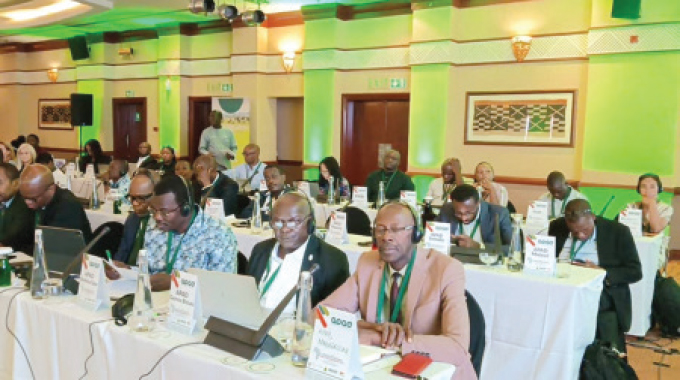Safeguarding biodiversity in protected areas MoU signed

Leonard Ncube, [email protected]
THE Africa Protected Area Directors (APAD) have signed a five-year Memorandum of Understanding (MoU) with the African Wildlife Foundation (AWF) to mainstream biodiversity conservation and help mobilise member states to work together in protecting the environment.
The MoU was signed recently following the successful hosting of the 2nd African Protected Areas Directors Conference 2024 in Victoria Falls.
The second edition of the APAD was held in Victoria Falls recently with over 150 participants, including Zimbabwe. It comprised protected area directors and their designated representatives from 31 countries.
APAD is a platform dedicated to promoting the conservation and sustainable development of Protected and Conserved Areas across Africa.
Through collaboration with diverse stakeholders, APAD aims to address common conservation challenges and advance global biodiversity and climate goals.
The Zimbabwe Parks and Wildlife Management Authority (ZimParks) hosted the conference, which was supported by APAD, the African Wildlife Foundation, which also houses the APAD secretariat, the German Federal Ministry for the Environment, Nature Conservation, Nuclear Safety and Consumer Protection (BMUV).
ZimParks director and technical advisor of International Conservation Affairs Professor Patience Gandiwa led the Zimbabwe team during the signing ceremony.

ZimParks
The MoU highlights joint commitments aimed at enhancing the effective management and operations of Africa’s protected and conserved areas (PCAs).
The overarching aim of sealing the partnership is to enhance the contribution of Africa’s PCAs in delivering the Kunming-Montreal Global Biodiversity Framework and the Paris Climate Agreement, particularly in the wake of the ongoing global biodiversity loss and climate change crisis.
The MoU commitments include establishing sustainable financing mechanisms, strengthening climate resilience and disaster preparedness for all of Africa’s PCAs and promoting co-operation mechanisms among APAD members and their networks.
In a statement, organisers of the APAD conference said the conference highlighted the pivotal role of PCAs in fostering sustainable development across Africa.
Africa’s natural resources, which are crucial for its socio-economic development, are facing increasing threats from land-use changes, over-exploitation and the impacts of climate change.
Recognising the importance of biodiversity to Africa’s future, APAD reaffirmed the significance of integrating nature conservation into sustainable development agendas, policy alignment, collaboration, integrated landscape management, documentation and youth engagement.
It also included the establishment of major groups, capacity building and financial partnerships.
“The Second Africa Protected Area Directors Conference in Zimbabwe concluded on a high note with the signing of a five-year Memorandum of Understanding (MoU) between the African Wildlife Foundation (AWF) and the APAD Network,” read the communiqué.
In terms of policy alignment, PCAs are essential for achieving Africa’s biodiversity targets, emphasising the need for integrated landscape management (ILM) supportive policies across sectors to avoid conflicts and promote conservation alongside productive land use.

Africa
“The effective ILM frameworks, supported by national policies and legal structures, are critical for ensuring sustainable development strategies that embrace conservation and productive land use. Recognising IPLCs as central to conservation efforts, APAD emphasised the importance of supportive policies, secure land tenure and collaborative actions to empower IPLCs in conservation initiatives.”
According to the communiqué, APAD committed to collaborating with the Alliance for Indigenous Peoples and Local Communities (AICA) to address common conservation challenges and advance global biodiversity and climate goals.
It stated that national registers of PCAs, with Free Prior Informed Consent (FPIC), will be established to highlight the importance and value of PCAs and Community Conservation Areas (CCAs).
It was resolved that APAD will collaborate with APAC Youth to implement conservation frameworks and promote inclusive decision-making processes.
APAD also announced the establishment of IPLCs and youth major groups to facilitate collaborative planning, implementation and benefit sharing.
In terms of capacity building, it was recognised that in terms of the importance of capacity building, APAD emphasised the need to enhance skills among stakeholders for effective PCA management, particularly in climate-resilient practices.
APAD will seek partnerships with local and international financial institutions to improve access to funding for conservation initiatives.
“Looking ahead, APAD and its partners will focus on enhancing regional and continental endorsement, synergising efforts with global goals and mobilising funds to support its action plan, including through the establishment of a pan-African Conservation Trust,” read the report.
The agreement outlines several key commitments aimed at enhancing the effective management and operations of Africa’s PCAs including appointing peer executive directors and managers from the APAD network to lead its membership, mobilising members to develop and pursue projects across various thematic initiatives and aligning thematic work with biodiversity and climate objectives outlined in the African Union’s Agenda 2063.
About 80 percent of tourists to Zimbabwe travel to view animals in protected areas hence the importance of conserving protected areas.










Comments